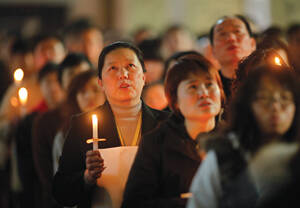As thousands of mainland Chinese receive permission to visit the “special status” region of Hong Kong each year, Cardinal John Tong sees an opportunity for the Diocese of Hong Kong to reach out to both the “open” and the “underground” Catholic Church in mainland China and facilitate further dialogue between Communist Chinese authorities and the Vatican. That relationship seemed to be improving in recent years but was thrown into upheaval last year by a series of episcopal appointments made by the Beijing-controlled Chinese Patriotic Catholic Association without approval from Rome.
Now both sides seem to be seeking a way to get relations back on track. “I hope that both sides would be patient and continue to be open to each other, listening to the other side so that they can have a deeper and more fruitful dialogue,” Cardinal Tong said. “That is what we need.”
In an interview with the Web site Vatican Insider published on March 13, Cardinal Tong said opportunities for continuing dialogue between Beijing and Rome remain to be explored and that “win-win” solutions to the problems that exist between them remain achievable. Cardinal Tong has reiterated his idea of Hong Kong as a “bridge-church,” helping the mainland church improve priestly formation, promote reconciliation and achieve full communion with the universal church. Cardinal Tong was elevated to the College of Cardinals in February.
Cardinal Tong said that China’s increasing role in international affairs should provide an opening for dialogue with the Vatican. Now Beijing has to appreciate, he said, “international values.... I think in the long run that China will change in very important ways.”
Cardinal Tong said his message to Chinese government officials is “to believe that our Catholic Church always asks each Catholic to be patriotic, to love his or her own country.” He said, “I would ask the government to trust also in Catholic believers so that if they really enjoy full freedom, they can make more contributions to their own country, and China and its government will enjoy a better reputation in the whole world. That would be a real ‘win-win’ situation for the Chinese government, for the country and also for the Catholic believers in China.”
Regarding the future of the Patriotic Association, assuming conditions improve for the church in mainland China, Cardinal Tong suggested that the association may continue to have a “low-key role” in the church. “They can be used as the agents or the members of social agencies,” he said, “like Caritas organizations under the mandates of the local bishops. That could be one of the ways out for them. But I don’t know whether they would accept that or not.”
Cardinal Tong said that improved formation can help bring an end to confrontations between Chinese authorities and the Vatican over episcopal appointments, creating candidates both sides would find acceptable or leading to episcopal nominees more willing and spiritually equipped to resist pressure from Beijing. “I think the Holy See was pushed into [a] corner last year,” Cardinal Tong said, referring to a series of illicit episcopal appointments, “but the important thing is the preventive formation, and we have to emphasize this.”








